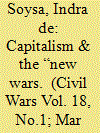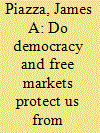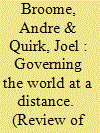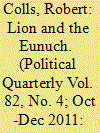|
|
|
Sort Order |
|
|
|
Items / Page
|
|
|
|
|
|
|
| Srl | Item |
| 1 |
ID:
145026


|
|
|
|
|
| Summary/Abstract |
Critics of globalisation suggest that growing free-market conditions generate anomie, leading ultimately to what some term ‘new wars’ and new insecurities. Others argue that liberal economies dissuade violence since people gain from peace. This study argues for a micro perspective that views predatory economic policies driving higher investment in rebellion-specific capital, such as shadow economic activity that easily translates into insurgency in weak-state settings. Investment in the shadows determines survivability against superior state forces, and survivability determines rebellion, by definition. Using civil war onset data from 1970 to 2013, as well as the Global Peace Index (GPI) and several of its individual components, which capture societal insecurity above and beyond the absence of armed violence, this study finds that countries that are more capitalistic have a lower risk of civil war and societal insecurity. The results are robust to alternative models, testing methods, and uphold when examining several relevant subcomponents of the index, such as internal conflict, violent crime, homicides, ease of access to small arms, and political instability. Surprisingly, democracy tends not to be associated with peace but associates with increased criminality whereas strong autocracy reduces it, suggesting that capitalism, more than democracy, associates with conditions favourable to societal security, independently of a country’s level of development.
|
|
|
|
|
|
|
|
|
|
|
|
|
|
|
|
| 2 |
ID:
086297


|
|
|
|
|
| Publication |
2008.
|
| Summary/Abstract |
This study empirically tests what has become a central component of US anti-terrorism policy under the Bush administration: that terrorism is a byproduct of illiberal political and economic systems. Employing a series of statistical analyses on incidents of terrorism in 153 countries from 1986 to 2003, the author finds that variables measuring democracy and degree of economic openness are not significant predictors of terrorism. However, the study does find that experience of state failures is significant, thus providing empirical backing for a small, descriptive body of scholarship linking failed states to terrorism.
|
|
|
|
|
|
|
|
|
|
|
|
|
|
|
|
| 3 |
ID:
142232


|
|
|
|
|
| Summary/Abstract |
Benchmarking practices have rapidly diffused throughout the globe in recent years. This can be traced to their popularity amongst non-state actors, such as civil society organisations and corporate actors, as well as states and international organisations (IOs). Benchmarks serve to both ‘neutralise’ and ‘universalise’ a range of overlapping normative values and agendas, including freedom of speech, democracy, human development, environmental protection, poverty alleviation, ‘modern’ statehood, and ‘free’ markets. The proliferation of global benchmarks in these key areas amounts to a comprehensive normative vision regarding what various types of transnational actors should look like, what they should value, and how they should behave. While individual benchmarks routinely differ in terms of scope and application, they all share a common foundation, with normative values and agendas being translated into numerical representations through simplification and extrapolation, commensuration, reification, and symbolic judgements. We argue that the power of benchmarks chiefly stems from their capacity to create the appearance of authoritative expertise on the basis of forms of quantification and numerical representation. This politics of numbers paves the way for the exercise of various forms of indirect power, or ‘governance at a distance’, for the purposes of either status quo legitimation or political reform.
|
|
|
|
|
|
|
|
|
|
|
|
|
|
|
|
| 4 |
ID:
108315


|
|
|
|
|
| Publication |
2011.
|
| Summary/Abstract |
The Lion and the Eunuch challenges the failures of British politicians to adequately understand the complexities, and the subtleties, of British national identity, and goes on to define it for them. It also explains reasons for our current confusions over who we are in the world. In 1940 Orwell wrote The Lion and the Unicorn as a rallying cry for a richly identifying country that was still able to imagine itself, and re-imagine itself, as the need arose. This essay suggests that without a radical change of government policy and thought, that power will continue to decline with far reaching consequences for the peoples of these islands.
|
|
|
|
|
|
|
|
|
|
|
|
|
|
|
|
| 5 |
ID:
139531


|
|
|
|
|
| Summary/Abstract |
In this paper, we provide one of the first systematic analyses of gender's effect on trade attitudes. We draw on a unique representative national survey of American workers that allows us to evaluate a variety of potential explanations for gender differences in attitudes toward free trade and open markets more generally. We find that existing explanations for the gender gap, most notably differences between men and women in economic knowledge and differing material self-interests, do not explain the gap. Rather, the gender difference in trade preferences and attitudes about open markets is due to less favorable attitudes toward competition among women, less willingness to relocate for jobs among women, and more isolationist non-economic foreign policy attitudes among women.
|
|
|
|
|
|
|
|
|
|
|
|
|
|
|
|
|
|
|
|
|